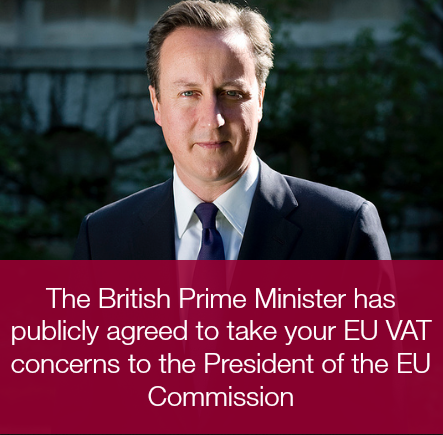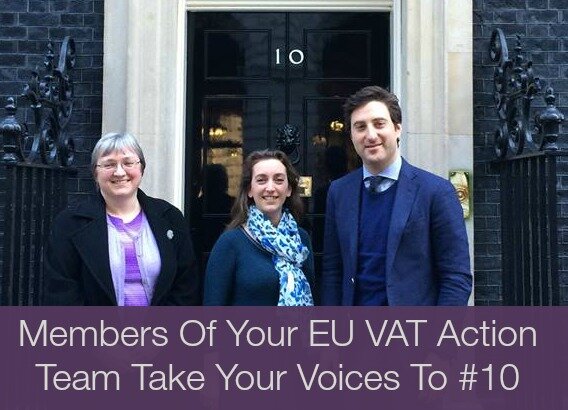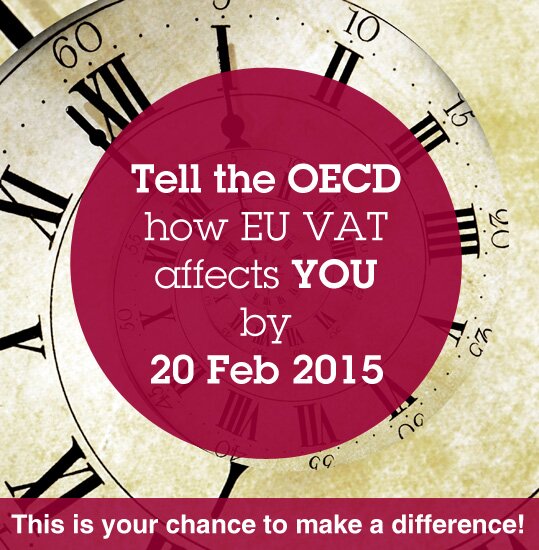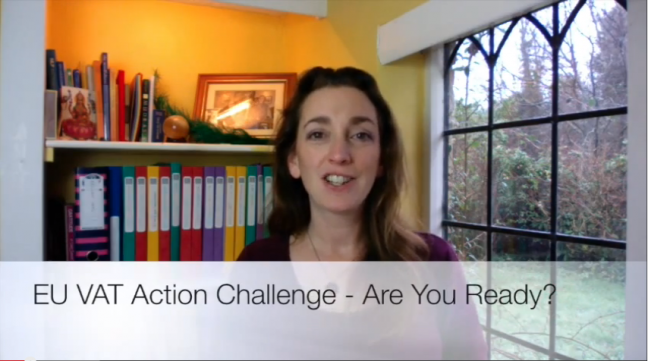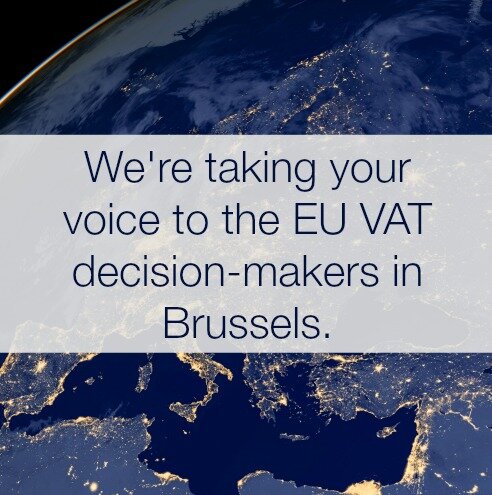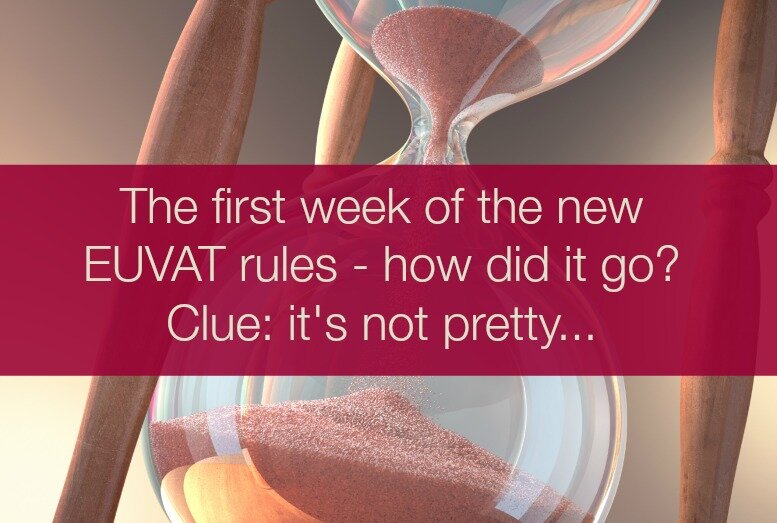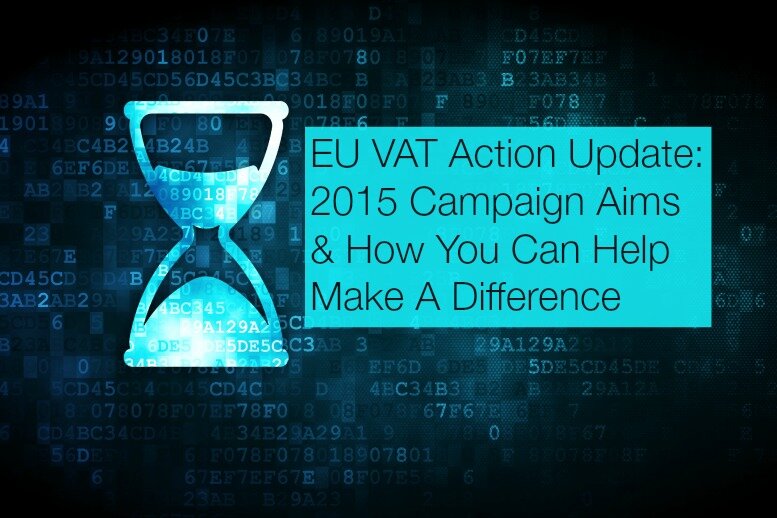As you may know, we have been working closely with the British Government and the Prime Minister himself over the past few months, on your behalf. The Prime Minister was aware of the issues with the EU VAT rules, but discussions between him and the EU Commission had been kept behind closed doors.
Last night his office went public. As the British national newspapers are now reporting, the UK Prime Minister is now publicly challenging Jean-Claude Juncker (President of the European Commission) over the new EU VAT rules, asking for a threshold below which the domestic VAT rules would apply, thereby removing the crippling unintended burden from micro businesses.
This is HUGE news and massive progress for your campaign. For the PM to go public on this, it means he is taking big action. And it will encourage other Member States to follow suit.
And the PM is so supportive of the work you have been helping us to do that we were asked to submit a quote for the Downing Street press release that announced David Cameron’s decision. And this quote has been used widely in the national press today. Your voice is being heard.
In addition, we’re really excited to tell you that the interim analysis of the survey that so many of you have filled in is being officially circulated by Downing Street, as evidence of the hugely damaging unintended consequences of the legislation. So THANK YOU to each of you who has already filled it in.
(If you haven’t yet, we’re still collecting data – here’s where to find it).
And there’s more! Caroline Lucas, MP, has raised an official question for us in Parliament today and she has a second lined up. Again, it might sound like a small step, but this is actually really important in creating the mood for legislation change. Thank you Caroline!
We are meeting with senior officials from HMRC, HM Treasury and Downing Street again this afternoon, and we’ll report back after the meeting.
We are also travelling to Brussels next week, to present to MEPs and senior members of the EU Commission, to help them understand how urgently a suspension of this legislation for micro businesses is needed.
And we need your help!
For any changes to happen, each of the EU Member States needs to agree to them. And the people who need to agree are the Finance Ministers and their EU Fiscal Attaches.
Here’s how you can help: the interim report from the quantitative study makes compelling reading and really helps people to understand that this isn’t a whinge-fest, but a real and painful issue for small businesses.
We need EACH AND EVERY Finance Minister in the EU to read this report, and to get emails from their home-grown businesses, explaining how the unintended consequences of this legislation are damaging them.
Therefore:
- Please could you write / email your Finance Minister and tell them your challenges, as well as sending them the pdf of the report. You can download the report here by right clicking on this link and choosing ‘save as’ or ‘download’.
- The list of Finance Ministers for each country and their email addresses is at the bottom of this post.
- Please then let us know via the comments that you have done it – and let us know which country you are in.
It doesn’t matter if your country has already been covered – just imagine the impact that getting 100 / 200 / 5000 emails with this report could have THIS WEEK, on the back of this massive wave of publicity from the media! The time to make your voice heard by your own government is NOW!
Then join us over at our friendly and informative Facebook group: EU VAT Action Campaign Group. We would love to see you there.
And above all, thank you for your support, your determined hope and your positivity. Without your help, we wouldn’t have achieved what we have achieved so far. There’s still a long way to go. But today’s news is a truly vital step on that journey.
Thank you!
With love, and gratitude,
Clare & the EU VAT Action Team
For political & media enquiries, please call +44 7437 905 435
EU Finance Ministers
Austria
Hans Jörg Schelling,
Alternate contact: (Assistants)
Twitter: @HJSchelling
Belgium
Johan Van Overtveldt,
Alternate contact: (Policy questions email (via http://financien.belgium.be/nl/Minister/)
Twitter: @jvanovertveldt
Bulgaria
Kalin Hristov,
Alternate contact: (Central email address)
Croatia
Boris Lalovac,
Cyprus
Harris Georgiades, No direct email found
Alternate contact: http://www.mof.gov.cy/mof/mof.nsf/page05_en/page05_en?OpenDocument (Web form)
Twitter: @Georgiades_H
Czech Republic
Andrej Babis,
Twitter: @AndrejBabis
Denmark
Bjarne Corydon,
Estonia
Maris Lauri,
Alternate contact: (Chancellor)
Twitter: @MarisLauri
Finland
Antti Rinne,
Twitter: @AnttiRinnepj
France
Michel Sapin, No direct email found
Alternate contact: (Frederic Glanois: Deputy Head of Office of Ministry of Finance)
Twitter: @Min_Finances (His own account exists but isn’t used)
Germany
Wolfgang Schäuble,
Alternate contact: (Sekretariat)
Twitter: @Wolf_Schauble
Greece
Yanis Varoufakis,
Twitter: @yanisvaroufakis
Hungary
Mihály Varga,
Alternate contact: (Customer service email)
Twitter: @Varga_Mihaly
Ireland
Michael Noonan,
Italy
Pier Carlo Padoan,
Twitter: @PCPadoan
Latvia
Jānis Reirs,
Lithuania
Rimantas Šadžius,
Luxembourg
Pierre Gramegna,
Twitter: @MinFinLux
Malta
Edward Scicluna,
Twitter: @edward_scicluna
Netherlands
Eric Wiebes, No direct email found
Alternate contact: https://www.rijksoverheid.nl/contact/contactformulier (General web form)
Poland
Mateusz Szczurek, No direct email found
Alternate contact: (Central email address)
Portugal
Maria Luís Albuquerque,
Romania
TBC, TBC
Slovakia
Peter Kažimír,
Twitter: @KazimirPeter
Slovenia
Dušan Mramor,
Spain
Luis de Guindos,
Sweden
Magdalena Andersson,
Alternate contact: http://www.gov.se/pub/road/Classic/article/117/jsp/Render.jsp?a=247188&m=popup&l=en (Webform, via Senior Registary Clerk)
United Kingdom
George Osborne,
